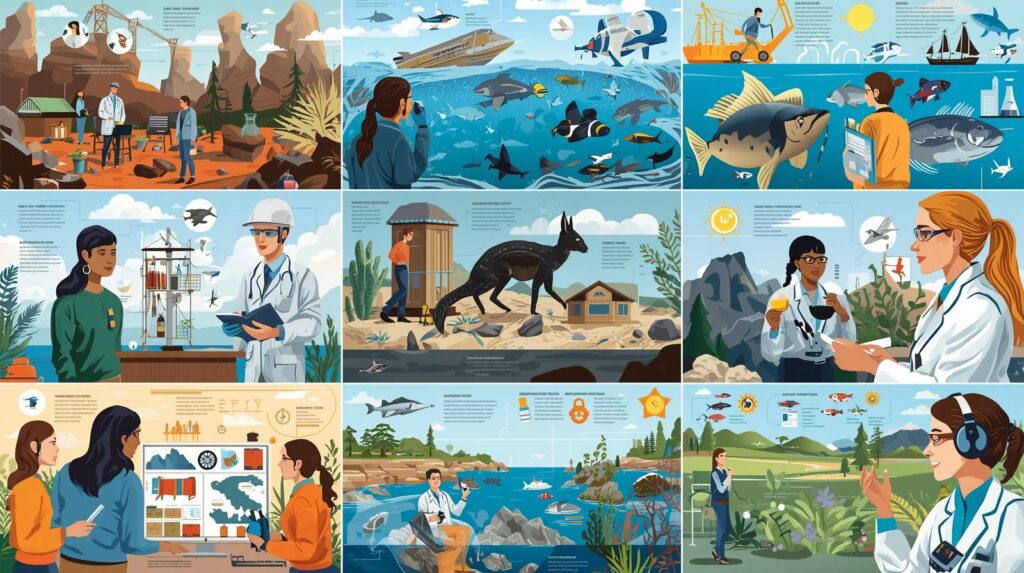Discovering the World through Earth Science: Careers and Degrees That Matter
Have you ever asked yourself why mountains form or oceans move? Or why the weather patterns change and how we can save our planet from damage? That’s the essence of earth science. It’s a discipline that plunges into the history of our world, from beneath our feet up to the sky above. Earth science isn’t all about dirt and rocks—it’s about learning how everything on our planet is linked and how it all changes throughout time. If nature interests you and you’d like a career that allows you to explore it, an earth science degree could be your ideal course of study.
Earth science covers a lot of ground, quite literally. It encompasses the study of the land, water, air, and even living things that affect our surroundings. Scientists in this field examine things such as volcanoes, earthquakes, climate changes, and natural resources. They assist us in determining how to live on Earth in a better way without harming it. For children in middle school or for beginners, think of it as being a planet detective. You find clues in fossils, weather, and dirt to solve big mysteries.
Lots of people opt for earth science because it’s practical and interesting. You get to go outside, hike mountains or sample water in rivers. It’s not all outdoors, though—there’s also lab time where you work with things like microscopes and computers to study what you’ve discovered. If you enjoy science courses at school, particularly ones on biology, chemistry, or physics, this might be you. And with the world struggling with the likes of climate change and resource scarcity, earth science careers are more vital than ever.
Why Become an Earth Science Major?
Choosing an earth science major is an entry point to a universe of discovery and meaning. It’s for people who enjoy questioning the natural world. Perhaps you’re the kind who picks up rocks on vacations with your family or sits through dinosaur documentaries. Or maybe you’re concerned about pollution and wish to make a difference. Whatever floats your boat, this discipline allows you to convert that passion into an actual profession.
A major reason to take the plunge is the diversity. Earth science is not one thin line—it’s a combination of subjects. You can specialize in geology, all about rocks and the formation of the Earth. Or hydrology, water flows and supplies. Atmospheric science if you’re into weather and climate, or oceanography if the ocean is your passion. These disciplines overlap, so you get a taste of everything.

There are numerous other advantages to the job market. There is a growing need for earth science professionals because we have to have specialists dealing with environmental issues, discovering sources of energy, and designing safe construction locations. Government organizations, private industries, and nongovernmental organizations all employ them. And salaries can be good, particularly with experience. It’s a line of work where what you do counts—you could assist in forecasting floods to save people or devise methods for preserving water in arid regions.
Earth science also develops skills that will last a lifetime. You’ll be able to think critically, problem-solve, and collaborate in groups. Many courses involve field trips to actual locations, such as mountains or coastlines, where you survey features and gather data. These hands-on activities make learning exciting and get you ready for the real world. If you are still in high school, enrolling in math, science, and even geography classes can put you ahead of the game.
Types of Degrees in Earth Science
Getting started usually means earning a degree. Most people begin with a bachelor’s in earth science or a related area like geology or environmental science. This takes about four years and covers basics like Earth’s history, mineral types, and weather systems. You’ll take lab classes to practice identifying rocks or measuring water quality. Some schools offer special tracks, like focusing on marine studies if you’re near the ocean.
A bachelor’s degree is sufficient for most entry-level earth science positions, such as lab technician or assistant. But if you desire more senior roles, look into a master’s degree. That takes one or two years and allows you to specialize more deeply, such as in the study of earthquakes or climate models. Master’s programs tend to involve research projects, and you may get to examine a local river or satellite data.
For top-level positions, like leading research or teaching at colleges, a PhD is the way to go. This can take four to six more years after your bachelor’s. You’ll do original studies, maybe on ancient fossils or volcanic activity, and write a big paper about your findings. PhDs open doors to jobs in universities, big labs, or high-level consulting.
Regardless of the level, find programs with solid field components. Such as summer camp where you sleep out and chart geological structures. Certifications can assist as well, such as becoming a licensed geologist, which some states mandate for some employment. There are online programs available for flexibility, but hands-on earth science degrees shine with direct experience.
Skills You Need for Success
To thrive in earth science careers, certain skills stand out. First, a love for science is key—you’ll use math to calculate erosion rates or chemistry to test soil samples. But it’s not all numbers; communication matters too. You might write reports on findings or explain risks to community groups.
Field skills are enormous. GPS tool usage, taking samples safely, and map reading prepare you for fieldwork. At the lab, you’ll work with machines such as spectrometers to analyze minerals. Computer expertise assists modeling software that forecasts weather or monitors groundwater.
Soft skills are valuable too. Adaptability is crucial because the weather can change things quickly. Teamwork excels on group work or field crews. And curiosity propels it all—constantly inquiring why something happens creates breakthroughs.
Most learn these via internships. Practice with an internship from a park service or environmental company. Volunteer for cleanups or science clubs to get your resume on the board early.
Popular Careers in Earth Science
The best part? Tons of earth science careers to pick from. Let’s break down some common ones, with what they do and why they’re cool.
- Begin with geologists. They analyze rocks and layers of Earth to learn history and discover resources such as oil or minerals. A day could be spent trekking to get samples or drilling at locations. Entry-level salary is about $50,000, but those with experience make more than $90,000. It’s a good career if you enjoy puzzles and travel.
- Environmental scientists concentrate on preserving nature. They sample air, water, and soil for pollution and recommend remedies. Consider consulting factories about waste or assisting cities in planning green areas. Salaries are around $70,000, with expansion anticipated as eco-awareness increases.
- Weather forecasters forecast weather and examine climate. They look at satellite and station data to predict storms or monitor long-term trends. Weather people on TV are well known, yet most work for farms or airlines. Salaries begin at $50,000 and reach up to $100,000 for specialists.
- Hydrologists work with water. They map out rivers, inspect quality, and prepare for floods or droughts. Work may be with governments controlling supplies or construction companies constructing dams. Average pay is around $80,000.
- Oceanographers study seas, looking into currents, marine life, and changes to the coast. They may dive for samples or employ robots in deep water. It’s exciting, with salaries ranging from around $60,000 to $90,000.
- Paleontologists search for fossils to understand life in the past. They excavate locations and reconstruct dinosaur tales. Museums or schools employ them, with pay ranging from $50,000 upwards.
- Seismologists monitor earthquakes and tectonic plates. They place sensors and issue warnings about hazards. Compensation is good, frequently above $80,000.
- Botanists research plants, from woods to fields. They assist in conservation or improving crops. Mean salary $55,000.
- Geochemists analyze chemicals in rocks and water, supporting cleanup or mining. Salaries of about $75,000.
- Ecologists study how organisms are affected by environments. They may count wildlife in parks or weigh development influences. Compensation of about $65,000.
- Foresters take care of woods, planting and suppressing fires. Nature enthusiasts are at home here, earning $60,000.
- Arborists tend city trees, pruning and curing disease. It’s physical work, with compensation of about $45,000.
- Marine biologists specialize in ocean animals, from fish to coral. They study environments and dangers such as plastic pollution. Salaries $45,000 to $70,000.
- Climatologists monitor long-term weather patterns, assisting climate policy. Pay usually $90,000 and more.
- Volcanologists study volcanoes, monitoring areas such as Hawaii. Thrilling but dangerous, with good compensation.
- Astronomers, although space-oriented, connect with earth science by comparing planets. Excellent compensation, more than $100,000, but requires advanced degrees.
- Then some educators impart earth science to schools, shaping the future generation. Compensation is location-dependent, approximately $50,000.
- Earth knowledge is applied by geotechnical engineers to construct, testing ground for bridges or structures. Engineering spin, receive $75,000.
- Soil scientists optimize agriculture by analyzing dirt health. Central to feeding the world, earnings $60,000.
- Geophysicists apply physics in underground scans to discover oil or water. Technologically oriented, receive $85,000.
- Anthropologists occasionally bleed into one another, digging up human activities on the ground. Pay $60,000.
- These are only highlights—limnology for lake areas or sedimentology for river bottoms are more niches. Many work as techs first, making $40,000, and progress.
Job Outlook and What You Can Earn
The future is good for earth science careers. As more emphasis is put on green energy and disaster preparedness, positions are increasing. The Bureau of Labor Statistics indicates geoscience careers will increase 5% by 2032, quicker than average. Earth and environmental fields may increase even further, 6-8% percent.
Salaries vary with company, location, and position. Entry-level could be $40,000-60,000, while senior reach $100,000+. States that are petroleum-rich pay better for petroleum geologists. Government positions provide stability, private industry more pay but increased travel.
.Benefits might include fieldwork benefits, such as company trucks or travel allowances. Flexible hours exist in some jobs, shift work in others for monitoring.
Ready to begin? High school students, load up on math and science. Volunteer at nature centers or garden clubs.
For college, study schools with good programs—find ones with internships and field trips. Get scholarships; tons are available for STEM careers.
While in studies, get internships. Work summers in labs or national parks. Network from conferences or alumni.
Following graduation, enhance your resume with projects and skills. Job boards post earth science jobs. Certifications are considerations for the boosts.
Challenges and Benefits of the Profession
Not everything is a breeze. Fieldwork involves inclement weather, insects, or isolated areas. Some assignments have risks, such as volcanoes. Deadlines can be stressful, particularly for consulting.
But the payoffs? Watching your work benefit—perhaps saving a town from floodwaters or discovering a new mineral. Go to incredible locations, from beaches to canyons. And the joy of protecting Earth for future children.
Others describe the community as close-knit, with lifelong friends made through field camps. It’s a field where dedication is rewarded.
Wrapping It Up
Earth science degrees and careers provide an opportunity to discover, preserve, and explore our incredible planet. If you’re excavating fossils, predicting storms, or designing sustainable farms, it’s work that matters. If this is something that excites you, take the plunge—begin with a class or a book. The world needs earth science experts, and you might be among them.
